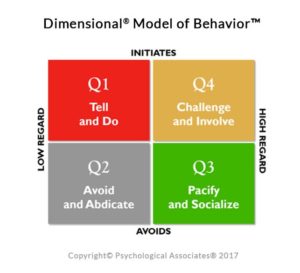Poor Performance
When an employee’s performance is sub-par, how do you discuss it without offending him? And how do you motivate him to actually improve performance rather than just giving it lip service? Master this and you’ll learn a key leadership skill! In this case example, we’ll explore several alternatives for managing poor performance. We’ll show you the best approach so you can be most effective.
The Situation
Sam leads corporate development for a financial organization with an aggressive program for expansion into other regions. Sam’s team is responsible for building new facilities. One team member, Daniel, specializes in locating desirable properties.
Poor Job Performance
Lately, Sam has noticed that Daniel’s work is not up to his normally high standards. The team is heading into a busy stretch, but just when activity is heating up, Daniel’s poor performance is dragging down the team’s efforts. Normally, his analysis is very good, but now he seems to have a lot of excuses for late and sub-par work.
Poor Employee Performance – How to Improve
Sam feels Daniel hasn’t been hitting his targets for some time. Daniel has a lot of excuses for his recent performance; some of them are real, but they don’t account for the full picture. Daniel used to come through without fail, but now it’s one thing after another. With demanding work coming in the next couple of months, Sam needs to coach Daniel, but he’s not certain Daniel recognizes the problem.
What approach should Sam employ in managing poor performance to turn Daniel’s work around?
How to Discuss Poor Performance with an Employee
Here’s Your Q4 Answer!
Dr. David Rowan: Hi, I’m David and I have the Q4 Answer.
Discussing Performance Issues with Your Direct Reports
While we recommend regular, on-the-fly feedback with your direct reports, a conversation like this is better served with a more formal coaching discussion.
What’s a Good Method for Planning the Coaching Conversation?
Using the five-step conversation will start you off on the right track and make sure neither person goes off course.
What Behaviors Can Increase My Coaching Effectiveness?
Avoid Q1 behaviors like over controlling the conversation. Try not to use a harsh tone or be overly directive. Don’t jump to conclusions. Q2 behavior won’t solve the problem either. In coaching for improved work performance, ignoring Daniel’s recent results will not make the issue go away.

What’s Wrong with Being Friendly When Delivering Tough Feedback?
Q3 behavior, being overly friendly, might lift Daniel’s spirits in the short-term. But, like Q2, in the long term it will not change the root of the situation.
Which Specific Q4 Behaviors Will Help This Conversation Move in a Positive Direction?
Most effective coaches use Q4 behaviors. Start with questions and probe to promote self-discovery. Open-ended questions in particular, could help Sam discover why the quality of Daniel’s work has declined.
Why Do Open End Questions Help?
Closed ended or leading questions can feel accusatory, or critical in a conversation like this, and if Daniel feels like he’s being backed into a corner, he could shut down. But receptivity rises with open-ended questions, making Daniel an active participant and thinking about how to improve his own performance.
How Can Q4 Behavior Help Develop an Action Plan?
It is tempting to develop solutions for your direct reports but resist the urge. Instead, increase buy-in by encouraging Daniel to create his own plan. The Q4 leader’s behavior is to provide guidance–making sure the plan has specific goals and dates and to get commitment to follow through.
To Recap…
By using the five-step format to plan feedback and by probing for the other person’s input, the Q4 manager will encourage receptivity. This will increase true commitment and execution, resulting in improved performance.
Beyond Managing Poor Performance
Now that you have learned about managing poor performance, check out our other educational leadership resources. We have 40 additional case situations, white papers, books,…
You might also enjoy our post on best practice performance reviews.
Ready to advance from educating yourself about leadership to exhibiting Q4 leadership? You’ll find leadership workshops, individualized coaching, 360 feedback and more on our leadership development page.
And be sure to sign up for our monthly e-newsletter for more people skill learning and upcoming events.












